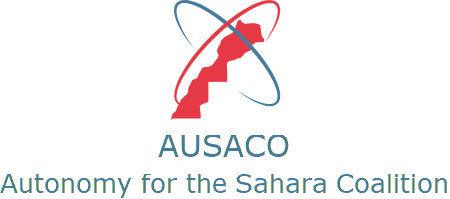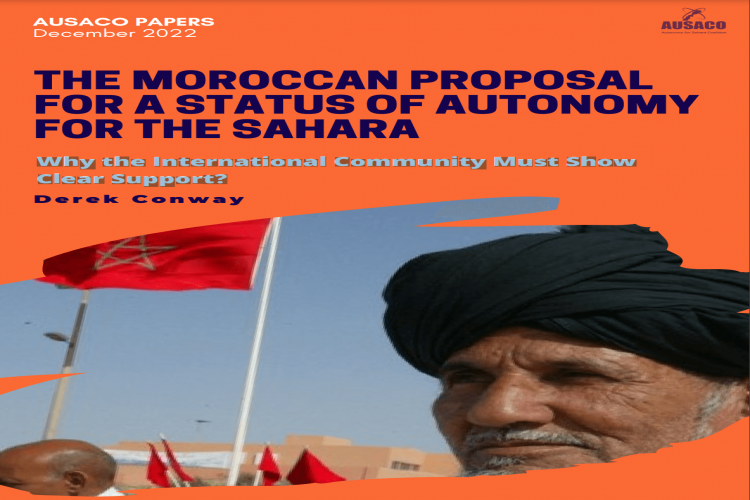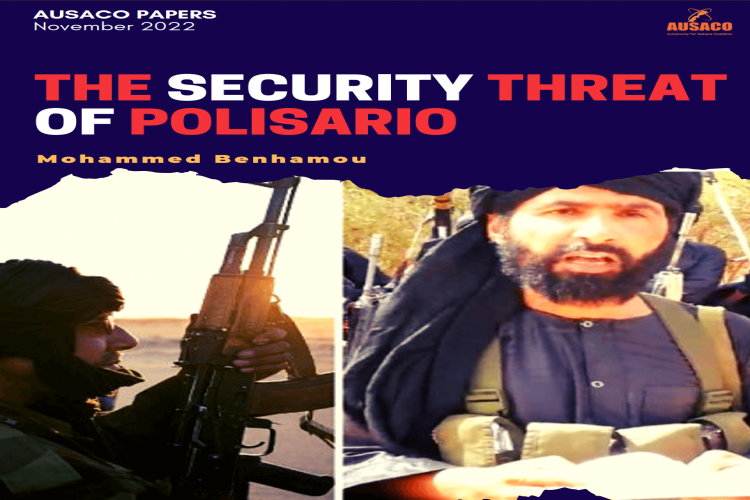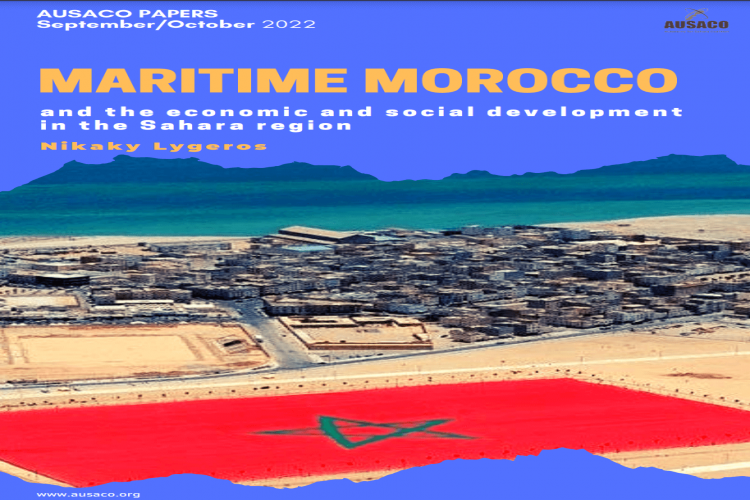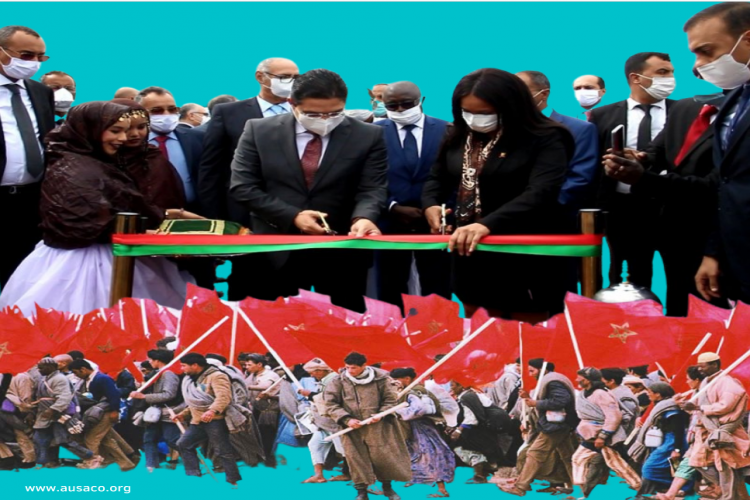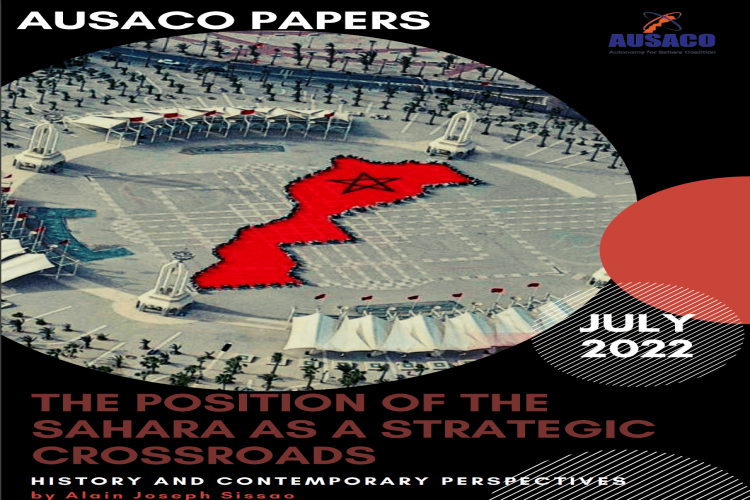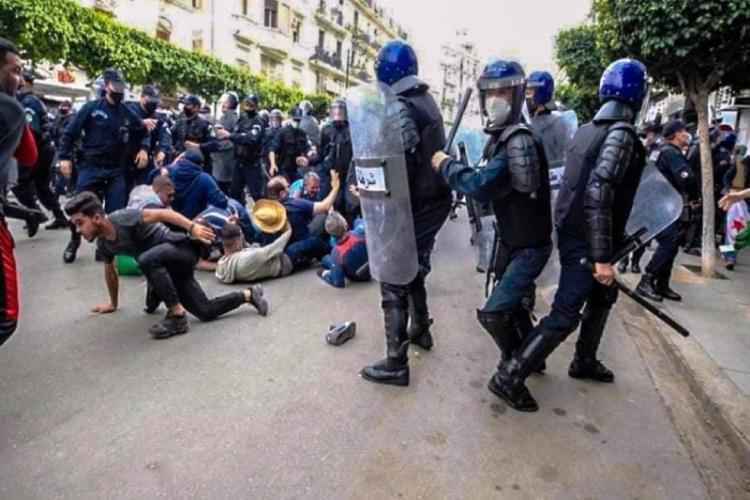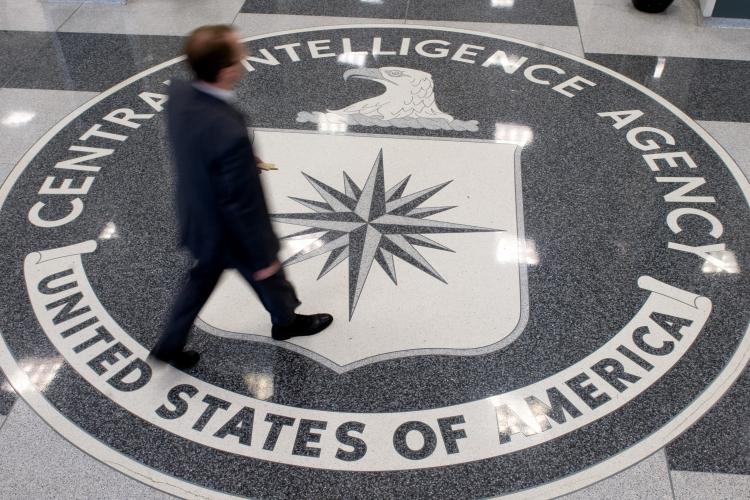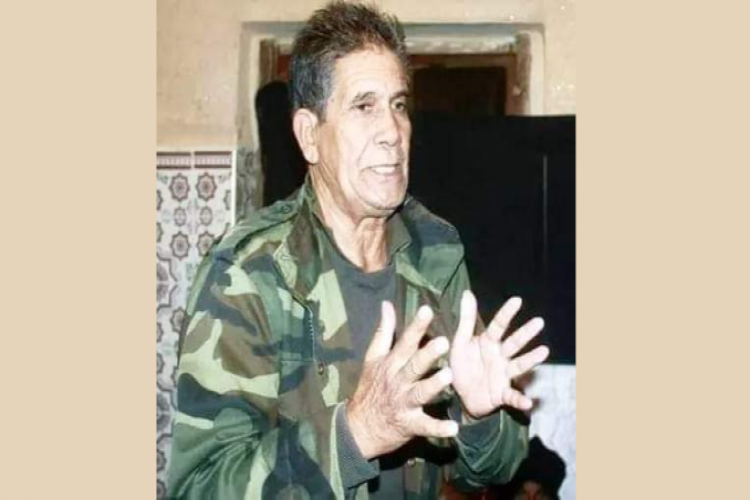| Attachment | Size |
|---|---|
| Download It (5.09 MB) | 5.09 MB |
The humanitarian situation in the Tindouf camps, in Algeria, has been frequently misrepresented by scholars interested in the regional dispute on the Moroccan Sahara. While the literature rightly points out the harsh climatic conditions and the difficult humanitarian situation prevailing in the camps, marked by widespread poverty and malnutrition, little is said about the political conditions and the actors that resulted into the displacement of Sahrawi civilians in the camps and their continued presence on Algerian territory in such tragic conditions. Even the militarization of the Tindouf camps, which needs no specific demonstration as the “Polisario Front”, a non-state armed actor based on this part of Algerian territory, is entirely omitted altogether from standard academic works on the Tindouf camps.
Worse still, some scholars adopt a romantic, if not outright biased approach to the issue of the Tindouf camps by idealizing the healthcare and education services provided in the camps, seeing them as precursors of Sahrawi “statehood”. One such examples is found in the work of Alice Wilson, who enthusiastically speaks of “Sahrawi sovereignty in exile” under the form of the so-called “Sahrawi Arab Democratic Republic” based in the Tindouf camps[1]. According to this narrative, the management of the camps by “Polisario” is encapsulated under the concept of “state-movement”, that is, a so-called “liberation movement” that has metamorphosed into a “state”.
While these accounts rightly point out the “uniqueness” of the Tindouf camps, they do so with reference to fantasized “self-sufficiency” and “democratic participation”, not the actual peculiarity of these camps, which is the illegal devolution of power by Algeria to “Polisario” over a part of its territory. Such narratives epitomize the fundamental problem striding across English-speaking scholarship on the issue of the Tindouf camps, and on the regional dispute on the Sahara at large: The complete omission of Algeria’s role in the inception of the dispute, the displacement of Sahrawis to Tindouf, and their maintenance into a state of legal limbo that makes possible the worst abuses of their rights[2].
In fact, a thorough, dispassionate analysis of the humanitarian dimension of the regional dispute over the Sahara confirms the direct involvement and the flagrant responsibility of Algeria in the genesis and the persistence of this dispute, the true nature of “Polisario”, and the absence of cooperation between Algeria and international organizations.
This chapter takes another approach to the issue of the Tindouf camps by analysing it as an integral part of the regional dispute over the Sahara. Specifically, I address the militarization of the Tindouf camps, the systematic embezzlement of humanitarian aid, and human rights abuses as central phenomena in the Algerian strategy aiming at thwarting Morocco’s territorial integrity through the maintenance of the artificial dispute over the Moroccan Sahara.
Algeria has been actively manoeuvring since 1973 to thwart the completion of Morocco’s territorial integrity, with the aim of achieving regional hegemony and gaining access to the Atlantic Ocean. As part of this strategy, Algeria created, with the help of the Kadhafi regime in Libya, a non-state armed group, the “Polisario Front”, as a proxy group.
Allegedly a “liberation movement”, the “Polisario Front” never fired a single shot against the Spanish occupiers and was created only as it became clear that that decolonization of the Moroccan Sahara could only result in its reintegration with Morocco. In fact, many of the members of “Polisario” were previously part of the Spanish occupation forces, including its current leader, Brahim Ghali.
From the moment of the reintegration of the Sahara into Morocco as per the Madrid Agreement signed by Morocco, Mauritania, and Spain, the “Polisario Front” engaged, with the military support of Algeria, in intimidation acts intended essentially to draw large numbers of civilians on Algerian soil. Many of the civilians are drawn from neighbouring countries, where drought had pushed populations away from their dwellings. According to Arnold Hottinger, this endeavour was an integral part of Algeria’s strategy of creating a “people” anew, in the service of its hegemonic agenda in North Africa[3].
Since then, thousands of civilians have been held hostage in the Tindouf area, a remote and heavily militarized region of Algeria and one of the most arid zones on earth.
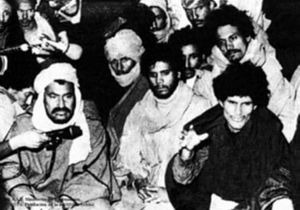
From the inception of this so-called “refugee” problem until today, the issue of their precise number has been a key aspect of the regional dispute over the Sahara. Indeed, Algeria has never authorized the registration of the Sahrawis forcibly displaced to its territory, in defiance of its international obligations under international law.
The obligations of Algeria and the mandate of the UNHCR are clear. In accordance with the Convention on the Status of Refugees and as the host country, Algeria has an obligation to provide identity documents to the refugees on its territory (article 27) and to cooperate with UNHCR in the exercise of its mandate and the monitoring of the implementation of the various obligations contained in the Convention (article 35). Moreover, the various Conclusions of the UNHCR Executive Committee (EXCOM) coherently assert the importance of refugee census and registration as fundamental protection mechanisms:
- EXCOM Conclusion no 91, adopted in 2001, “acknowledges the importance of registration as a tool of protection” and “requests States, which have not yet done so, to take all necessary measures to register and document refugees and asylum-seekers on their territory as quickly as possible upon their arrival, bearing in mind the resources available, and where appropriate to seek the support and co-operation of UNHCR”.
- EXCOM Conclusion no 95, adopted in 2003, “acknowledges the importance of early and effective registration systems and censuses as a tool of protection and as a means to enable the quantification and assessment of needs for the provision and distribution of humanitarian assistance and to implement appropriate durable solutions”.
In the same vein, UN General Assembly resolutions collectively insist on the importance of adequate registration of refugees. The latest resolution of the UN body, resolution 74/131 “recognizes the importance of early registration and effective registration systems and censuses as a tool of protection and as a means to the quantification and assessment of needs for the provision and distribution of humanitarian assistance and to implement durable solutions”.
The mandate of UNHCR must apply to Algeria as the host country without any restriction and in accordance with the legal and humanitarian parameters defined by international refugee law, just as to all other refugee situations in the world. Yet, as a report of UNHCR’s Inspector General’s Office shows, “no registration exercise of the Sahrawi refugees has ever taken place, and UNHCR has continuously relied on figures provided by the Algerian government”[4].
The same report shows that the estimates made by Algeria of the number of “refugees” in the Tindouf camps have been systematically overblown compared with those made by UNHCR. In 1975, the Algerian local authorities referred to an influx of 20.000 persons in Tindouf, while UNHCR’s own estimates amount to 12.000 persons. Again, in 1976, a representative of the World Food Program noted, with reference to the figure communicated by the Algerian government, that “the number of refugees is far from accurate and the estimate of individual family size appears to be very large”. UNHCR has made three formal requests to the Algerian government to allow the registration of the inhabitants of the Tindouf camps, which were all turned down.
In the absence of a reliable census, humanitarian aid is not based on any verifiable data. In 2005, pending a serious census, the World Food Program (WFP) and UNHCR decided to grant their assistance to a population estimated at 90.000 people. However, according to various assessments of the size of the population by demography experts based on satellite images or witness accounts of “Polisario” officials, the number of refugees falls between 40.000 and 50.000 people.
The absence of a census and a registration of the Sahrawis held against their will in the Tindouf camps has had another pernicious effect: It has enabled systematic embezzlement of the humanitarian aid provided by bilateral and multilateral donors to the civilian population in the Tindouf camps. Indeed, the discrepancy between the real population and the estimated population raises numerous issues. It makes adjusting aid impossible, yet it is crucial to be able to provide an adapted diet, especially to young children.
The discrepancy between the real population and the estimated population raises numerous issues. It makes adjusting aid impossible, yet it is crucial to be able to provide an adapted diet, especially to young children. It contributes to maintaining and the diversion of humanitarian aid, and the Sahrawi populations are, of course, the primary victims of these practices largely condemned by various international organizations, chiefly the UNHCR but also the WFP and NGOs.
The report of the European Anti-Fraud Office (OLAF) of 2009 has brought to light the diversion of humanitarian aid by Algerian officials and the militiamen of “Polisario”, specifying that “the number of beneficiaries is lower than that for which humanitarian aid is provided by the international community”. The report of the OLAF of 2009 has underlined the persistence, since the beginning of the conflict, of the same issues: uncertainty on the real number of refugees, absence of registration and census, lack of transparency and responsibility of the Algerian Red Crescent, and lack of monitoring.
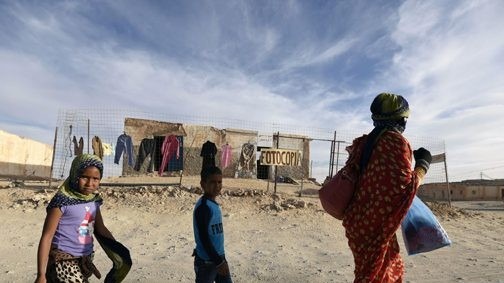
The OLAF was not the only one to bring to light these unlawful practices, which are in total contradiction with humanitarian law. Numerous investigations conducted by several international organizations have demonstrated the presence in the Algerian and Mauritanian markets of important quantities of food from international humanitarian aid.
On April 29, 2015, the European Parliament adopted a resolution taking note of the OLAF report and “calling upon the European Union Commission to clarify the measures taken in response to the findings of the report”. Furthermore, this resolution drew attention to the fact that “according to the UNHCR inquiry report, the non-registration of a refugee population for such a prolonged period constitutes an abnormal and unique situation in UNHCR’s history. The resolution further called upon the European Commission to ensure that Algerian and “Sahrawi” individuals incriminated by the OLAF report no longer have access to aid funded by the European taxpayers”.
The responsibility of Algeria towards the population of the Tindouf camps and its total abdication of its responsibilities towards them are clearly demonstrated. Morocco is not the only country that is concerned by the host country’s non-respect of international and that calls on Algeria that it fulfils its statutory obligations. The UN, the European Union, and NGOs have come to the same conclusions.
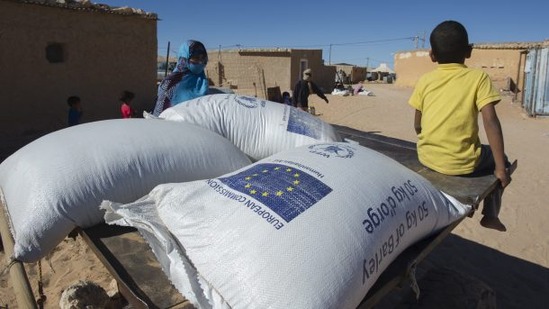
Security Council resolutions since 2011, namely resolutions 1979 (2011), 2044 (2012), 2099 (2013), 2152 (2014), 2218 (2015), 2285 (2016) and 2351 (2017), affirm that Algeria must cooperate with UN High Commissioner for Refugees (UNHCR) to conduct a census of the populations of the Tindouf camps. The prohibition of the UNHCR from fulfilling its statutory obligations must go neither trivialized nor glossed over in the reports and assessments of the humanitarian situation in the Tindouf camps.
The absence of census of the Tindouf camps population is a central dimension of the regional dispute on the Sahara, as it provides “Polisario” with profitable avenues for embezzlement and thus to pursue its military activities at the expense of the security of the states of the Sahel.
The militarization of refugee camps has been widely recognized as harmful to the safety of civilians in the camps. International humanitarian law clearly provides for the prevention of the militarization of refugee camps through setting host countries’ obligations to maintain the civilian character of refugee camps. In its Conclusion no. 94 on the civilian and the humanitarian character of asylum, adopted in 2002, UNHCR’s Executive Committee has recommended that States receiving a mixed flow of refugees and combatants take measures to disarm armed combatants, identify and separate combatants from civilians, and intern combatants.
UN General Assembly resolutions A/58/149, A/59/172 and A/60/128 “reaffirm[s] that host States have the primary responsibility to ensure the civilian and humanitarian character of asylum […] and, in particular, to ensure that the civilian and humanitarian character of refugee camps is not compromises by the presence or the activities of armed elements or used for purposes that are incompatible with their civilian character.”
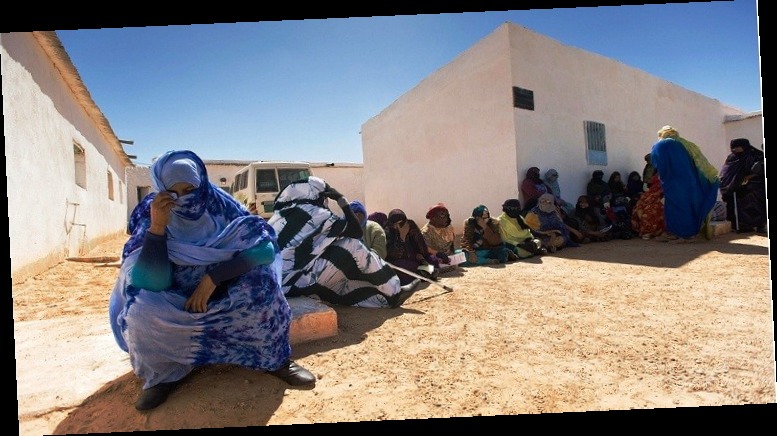
Empirical research shows that the primary determinant of militarization is the attitude of host country state. Yet, Algeria has been actively encouraging the militarization of the Tindouf camps, not only through allowing the influx of combatants and weapons into the area, but also through actively encouraging the launch of military operations from the Tindouf camps into Moroccan territory. This has become especially flagrant since the operation led on November 13, 2020, after which the “Polisario Front” declared its unilateral withdrawal from the ceasefire in place since 1991. Since then, Algeria has been not only supporting “Polisario’s” provocations, but also deploying its official media to disseminate allegations of a “war situation” in the Sahara[5].
In the case of the Tindouf camps, not only has Algeria failed its international obligations to prevent the militarization of the camps, but also it has also illegally devolved jurisdictional authority over the camps to “Polisario” in defiance of its obligations under international human rights law. In particular, Algeria violates its fundamental responsibility to protect, in accordance with articles 12, 16, and 26 of the Convention on the Status of Refugees of 1951, persons on its territory by delegating authority to a non-state actor that is not a party to any international human rights treaty.
In doing so, Algeria has created an unprecedented humanitarian situation in which a sovereign state has devolved sovereignty over a part of its territory to a non-state actor. The extent of the devolution has been such that the United Nations Human Rights Committee expressed, in July 2018, its concerns “over the de facto devolution of Algeria’s power to “Polisario””. These concerns were reiterated by the UN Secretary General on October 2, 2019, underlining that “that during the period considered that during the period under review, OHCHR received information on the harassment, arrest, arbitrary detention and ill-treatment of a human rights defender and a blogger engaged in documenting human rights violations man in the area. Both had denounced the management of the Tindouf refugee camps on social networks. They were arrested in June 2019 following a sit-in at the Rabouni camp to protest the forced disappearance in 2009 of the former “Polisario” executive, Sidi Ahmed El Khalil.”[6]
Civilians in the Tindouf camps are by far the persons whose rights are most harmed by the militarization and the illegal devolution of power to “Polisario”, but humanitarian workers have also been victims of various acts of intimidation on the part of “Polisario”.
A wide array of human rights abuse in the Tindouf camps, both on the individual and the collective levels, is made possible by the shirking by Algeria of its international obligations.
At the collective level, the situation of the populations of Tindouf is in itself a human rights violation, and foremost a collective one as it relates to the very status of the persons sequestrated in these camps. If Algeria takes on responsibility, this State which considers the populations of Tindouf as refugees, should guarantee them the rights that come with such a status. Yet, the populations of Tindouf do not benefit, in practice, from the rights guaranteed by this status and are subject to a discriminatory regime, which denies access to housing, employment, or nationality.
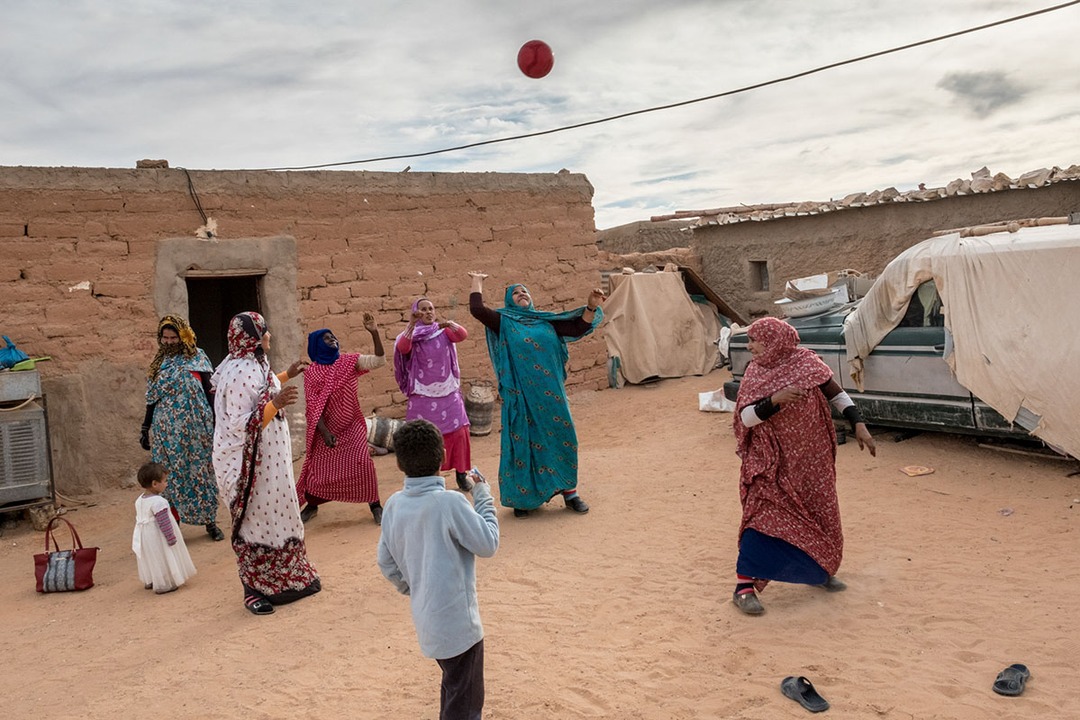
The uncertainty intentionally nurtured by Algeria and “Polisario” on the responsibility to protect the populations of Tindouf therefore leads to a legal vacuum, in which no State takes responsibility for the protection of the inhabitants of the camps. This situation is prejudicial to the respect of the rights of the persons in question who are made vulnerable within the legal framework they are in, and therefore subject to systematic violations of their fundamental rights on a daily bases, without any remedy.
At the individual level, the inhabitants of the Tindouf camps are deprived from their fundamental rights to freedom of movement, freedom of association, education, schooling, food, and work:
- Right to freedom of movement:
The populations cannot freely leave the camps, return to Morocco, or settle in other Algerian regions and cities due to the prohibitions imposed on them by the host country and the security services of “Polisario”.
The Algerian government allows “Polisario” to control movements within the four camps isolated outside the military zone of Tindouf. “Polisario” and the Algerian military keep checkpoints on the roads leading to the camps and those between the camps.
The refugees need a permit from the head of “Daïra” (the districts within the camps) to move from one “Daïra” to another in the same camp, to move from one camp to the other, or to move around Tindouf. The “refugees” also need a laissez-passer that is issued by “Polisario” according to its own criteria to travel to Algiers. On an exceptional basis and with the approval of the Algerian authorities, “Polisario” issues Algerian passports to a select number of persons. On the other hand, the Algerian government issues passports only to those allowed by “Polisario” to travel abroad. On the other hand, a few people have Mauritanian passports.
- Right to freedom of association, expression, conscience and assembly:
No opposition is allowed by “Polisario”, which imposes a totalitarian system and does not allow any dissident voices to express themselves. In recent years, a number of worrisome reports of harassment of human rights defenders have emerged among international organizations and international NGOs. The most eloquent case remains that of Ahmed Khalil Braih, a former “Polisario” executive turned dissident, who was kidnapped by the Algerian secret services in Algiers in 2009 and whose whereabouts remain unknown until now[7].
The Human Rights Committee of the United Nations, the body responsible for monitoring compliance with the International Covenant on Civil and Political Rights, has established the full responsibility of the Algerian authorities for the disappearance of Ahmed Khalil Braih in its decision adopted in July 2020[8], and held that his enforced disappearance is a case of torture, not only to the victim but also to the relatives. Furthermore, the Committee's experts acknowledged that the impossibility of judicial recourse after the de facto devolution of the State party's jurisdictional powers to the “Polisario Front”, as well as the lack of effective remedies for those in the Tindouf camps, continue to deprive Ahmed Khalil and his family of any access to their legal rights.
Other human rights defenders have been the victims of the atrocities committed by “Polisario” and the Algerian secret services. That is the case of the bloggers Moulay Abba Bouzid and Fadel Breica, who were victims of harassment, enforced disappearance and tortures at the hand of “Polisario” militiamen.[9]
Fadel Breica is a founding member of the Al Khalil Braih Coordination for the Defense of Human Rights in Western Sahara. He is a well-known activist who works on the issue of enforced disappearance in the region and human rights violations in the Tindouf camps. Upon participating in a sit-in organized in front of the Algerian Consulate in Madrid, in 2019, Breica returned to the Tindouf camps in April 2019, where “Polisario” militiamen accused him of treason and threatened him with physical violence. Soon afterwards, M. Breika was kidnapped by “Polisario” agents and held in secret detention for several weeks, during which he suffered torture and other ill-treatments. It was only after a significant degradation of his health that he was moved to a medical centre. Twenty-four days after his kidnapping, his relatives were allowed to visit him for ten minutes[10].
Moulay Abba Bouzid is a blogger known for critical publications on the widespread corruption in the Tindouf camps. On June 17, 2019, he was arrested in front of the UNHCR office in Rabbouni, during a sit-in, after which he was detained in a secret detention center for 36 hours. During this period, Bouzid remained blindfolded and his hands tied. It was only in October that he was released from detention[11].
- Right to work:
The « Sahrawi refugees » can work only in the informal sector in the vicinity of the camps. They need a work permit issued by the Algerian authorities to work outside the camps. Smuggling of cigarettes, medicines, and goods from humanitarian aid is an important source of income in the camps, which confirms the diversion of humanitarian aid.
- The practice of slavery:
Persons of color in the Tindouf camps are subject to systematic discrimination and violence, including slavery. These inhuman practices have been denounced at the international level by the foreign press and in several international NGO reports (France Libertés, Human Rights Watch and U. S Committee for Refugees and Immigrants, etc.). In this regard, two Australian journalists, Violeta Ayala and Daniel Fallshaw, having been invited to the Tindouf camps by “Polisario” in April 2007, shed light on this flagrant violation of human rights in the camps of Tindouf[12]. Human Rights Watch documented in its 2008 and 2013 reports the testimonies of people of color who testified about the sufferings of Black people in the camps, especially those who are "possessed" by notables who force them to do housework and animal husbandry[13].
In order to make their voices heard in the face of the complicit indifference of the leaders of the “Polisario”, the majority of whom have "slaves" to carry out domestic work and grazing their cattle, young Blacks in the Tindouf camps were organized, in an informal way, in an entity called " Freedom and Progress Association for Combatting against Slavery". This group was able to identify the existence in the Tindouf camps of 7,130 "slaves", including women, who are "raped, married against their will and sent to the desert to look after their masters' herds."
Civilians in the Tindouf camps are by far the persons whose rights are most harmed by the militarization and the illegal devolution of power to “Polisario”, but humanitarian workers have also been victims of various acts of intimidation on the part of “Polisario”.
In order to obfuscate its responsibility for the disastrous humanitarian situation in the Tindouf camps, Algeria has recourse to a strategy of exploiting isolated cases to cast a shadow over the human rights situation in the Sahara. While the international community unanimously recognizes the normalness of the human rights situation, Algeria and “Polisario” have been hard at work trying to create the illusion of systematic human rights violations in the region.
Usually relying on isolated allegations of human rights violations, Algeria and “Polisario” attempt not only to divert attention from the fundamental issue of the humanitarian situation in the Tindouf camps, but also from the responsibility of Algeria in the framework of the political process undertaken under the exclusive aegis of the United Nations. Indeed, it is only when the UN Security Council has decided to discard the referendum option and to turn to reaching a political solution as the only way towards a final settlement of the issue of the Sahara that Algeria and “Polisario” started disseminating allegations of systematic human rights abuse in the Sahara.
The Sahara, as an integral part of the Kingdom of Morocco, does not live in a state of emergency or in an extra constitutional situation. The region is not under siege or in a state of emergency, and the regions in question are not under lockdown, quarantined, or under any specific military or civilian regime.
The human rights situation in the Sahara region is not an exception compared to the rest of the Kingdom. This region has benefited from all the reforms launched in Morocco, under the aegis of His Majesty the King Mohammed VI, at the political, economic, and social levels, those related to human rights. In accordance with its Constitution, Morocco guarantees to its citizens the full enjoyment of the rights provided for by the international human rights treaties to which Morocco is a party.
The Sahara region is an open space that a growing number of civil society associations, mandate-holders of the special procedures of the UN Human Rights Council, representatives of national and international media, and other actors visit.
The human rights situation in the Moroccan Sahara cannot be considered as “grave and systematic human rights violations.” Allegations of human rights violations are often amplified and relayed through pro-separatist media. These allegations are in fact minimal and systematically dealt with due diligence by the relevant national bodies.
Overall, the full respect, promotion, and protection of human rights is an unwavering concern for the Kingdom of Morocco and a reality on the whole territory, including in the Moroccan Sahara.
Over the past forty-five years, Algeria has been consistently violating its obligations under international humanitarian law by refusing to allow a census of the Tindouf camps populations and by illegally devolving authority over this part of Algerian territory to a non-state group. The latter is truly a violation of every single human rights instrument to which Algeria is a party, as it allows it to escape its responsibilities with respect to the inhabitants of the Tindouf camps.
Furthermore, Algeria has consistently manoeuvred to prevent the voluntary return of the Sahrawis held hostage in the Tindouf camps for about forty-five years.
Reaching a political solution on the issue of the Sahara on the basis of the Moroccan Autonomy Initiative is the only towards a dignified return of the population of the Tindouf camps to the Sahara.
[1] Such academic work usually foregoes the fact that Polisario has never been recognized as a “national liberation movement”, and that the only status to which it is entitled within the United Nations is that of a petitioner, like dozens of others, before the UN Fourth Committee.
Wilson, Alice (2016). Sovereignty in Exile: A Saharan Liberation Movement Governs. Philadelphia: Pennsylvania University Press.
[2] Norwegian Refugee Council (2008). NRC Report : Western Sahara. Occupied Country, Displaced People. Oslo: Norwegian Refugee Council.
[3] Durand, Jacques-Henri (1977). « A propos de la sécheresse et ses conséquences au Sahel ». Les Cahiers d’Outre-mer, no. 120 : 383-403.
[4] UNHCR Inspector General’s Office/Investigation Unit (2005). Inquiry Report INQ/04/005. Issued on May 12, 2005 in Geneva.
[5] International Crisis Group (2021). Time for International Re-Engagement in Western Sahara. Retrieved from: https://www.crisisgroup.org/middle-east-north-africa/north-africa/western-sahara/b82-time-international-re-engagement-western-sahara
[6] Report of the UN Secretary General S/2019/787 to the UN Security Council issued on October 10th, 2019. Retrieved from: https://minurso.unmissions.org/sites/default/files/sg_report_english.pdf
[7] AlKarama (2016). “Algérie: L’affaire de l’enlèvement au centre d’Alger d’un haut responsable du Polisario devant l’ONU ». Retrieved from : https://www.alkarama.org/fr/articles/algerie-laffaire-de-lenlevement-au-centre-dalger-dun-haut-responsable-du-polisario-devant
[8] Decision adopted by the UN Human Rights Committee on March 27, 2020 under symbol CCPR/C/128/D/2924/2016. Retrieved from: https://www.alkarama.org/en/node/23685
[9] The human rights violations suffered by Fadel Breika and Moulay Abba Bouzid are detailed in the Communication DZA 2/2019 of the Working Group on Arbitrary Detention, the Working Group on Enforced and Involuntary Disappearance, the Special Rapporteur on the promotion and the protection of the right to free opinion and speech, the Special Rapporteur on the right to peaceful assembly and freedom of association, the Special Rapporteur on the Situation of Human Rights Defenders, and the Special Rapporteur on Torture and Other Cruel, Inhuman or Degrading Treatment or Punishment. Retrieved from: https://spcommreports.ohchr.org/TMResultsBase/DownLoadPublicCommunicationFile?gId=25161
[10] Ibid.
[11] Ibid.
[12] Fallshaw, Dan and Violeta Ayala (2013). “First Person: The ‘Stolen’ Filmmakers Explain How a Doc About Refugees Became a Controversial Film About Reported Slavery”. Retrieved from: https://www.indiewire.com/2013/02/first-person-the-stolen-filmmakers-explain-how-a-doc-about-refugees-became-a-controversial-film-about-reported-slavery-40629/
[13] Human Rights Watch (2013). Off the Radar: Human Rights in the Tindouf Refugee Camps. Retrieved from: https://www.hrw.org/report/2014/10/18/radar/human-rights-tindouf-refugee-camps
